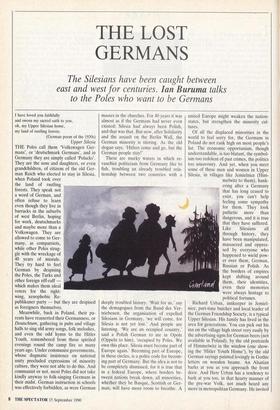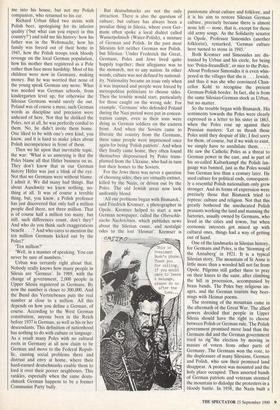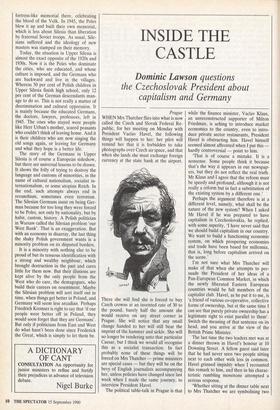THE LOST GERMANS
The Silesians have been caught between east and west for centuries. Ian Buruma talks to the Poles who want to be Germans
I have loved you faithfully and sworn my sacred oath to you, oh, my Upper Silesian home, my land of rustling forests.
(German poem of the 1930s)
Upper Silesia THE Poles call them 'Volkswagen Ger- mans', or `deutschmark Germans', and in Germany they are simply called 'Polacks'. They are the sons and daughters, or even
grandchildren, of citizens of the old Ger- man Reich who elected to stay in Silesia, when Poland took over the land of rustling forests. They speak not a word of German, and often refuse to learn even though they live in barracks in the suburbs of west Berlin, hoping for work, deutschmarks and maybe more than a Volkswagen. They are allowed to come to Ger- many, as compatriots, while other Poles strug- gle with the wreckage of 40 years of misrule. They try hard to feel German by despising the Poles, the Turks and other foreign riff-raff — which makes them ideal voters for the right- wing, xenophobic Re- publikaner party — but they are despised as foreigners themselves.
Meanwhile, back in Poland, their pa- rents have reasserted their Germanness, or Deutschtum, gathering in pubs and village halls to sing old army songs, folk melodies, and even the odd hymn to the Hitler Youth, remembered from those spirited evenings round the camp fire so many years ago. Under communist governments, whose dogmatic insistence on national unity precluded expressions of minority culture, they were not able to do this. And communist or not, most Poles did not take kindly anyway to folk-singing Germans in their midst. German instruction in schools was effectively forbidden, as were German
masses in the churches. For 40 years it was almost as if the Germans had never even existed; Silesia had always been Polish, and that was that. But now, after Solidarity and the assault on the Berlin Wall, the German minority is stirring. As the old slogan says, Ilitlers come and go, but the German people stay!'
These are murky waters in which re- vanchist politicians from Germany like to fish, troubling an already troubled rela- tionship between two countries with a deeply troubled history. 'Wait for us,' say the demagogues from the Bund des Ver- triebenen, the organisation of expelled Silesians in Germany, 'we will come, for Silesia is not yet lost.' And people are listening. 'We are an occupied country,' said a Polish German to me in Opole (Oppeln to him), 'occupied by Poles. We own this place. Silesia must become part of Europe again.' Becoming part of Europe, in these circles, is a polite code for becom- ing part of Germany. But the idea is not to be completely dismissed, for it is true that in a federal Europe, where borders be- tween nations break down, all minorities, whether they be Basque, Scottish or Ger- man, will have more room to breathe. A united Europe might weaken the nation- states, but strengthen the minority cul- tures.
Of all the displaced minorities in the world to feel sorry for, the Germans in Poland do not rank high on most people's list. The economic opportunism, though understandable, is too blatant, the symbol- ism too redolent of past crimes, the politics too unsavoury. And yet, when you meet some of these men and women in Upper Silesia, in villages like Jemielnice (Him- melwitz to them), hank- ering after a Germany that has long ceased to exist, you can't help feeling some sympathy for them. They look pathetic more than dangerous, and it is true that they have suffered.
Like Silesians all through history, they have been manipulated, massacred and oppres- sed by everyone who happened to wield pow- er over them, German, Russian or Polish. As the borders of empires kept shifting around them, their identities, even their memories were always hostage to political fortunes.
Richard Urban, innkeeper in Jemiel- nice, part-time butcher and local leader of the German Friendship Society, is a typical Upper Silesian. His family has lived in the area for generations. You can pick out his inn on the village high street very easily by the advertising signs for German beers (not available in Poland), by the old postcards of Himmelwitz in the window (one show- ing the 'Hitler Youth Home'), by the old German sayings painted lovingly in Gothic letters on wooden beams. An Alsatian barks at you as you approach the front door. And Herr Urban has a tendency to bark at you too, in that hearty manner of the pre-war Volk, not much heard any more in metropolitan Germany. He invited
me into his house, but not my Polish companion, who returned to his car.
Richard Urban filled two steins with Polish beer, apologising for its inferior quality (tut what can you expect in this country?') and told me his history: how his father was in the Wehrmacht, how his family was forced out of their home in 1945, how the Polish troops took bloody revenge on the local German population, how his mother then registered as a Pole rather than face more hardship. Most of his children were now in Germany, making money. But he was worried that none of the young speak German any more. What was needed was German schools, from kindergarten level up, for otherwise the Silesian Germans would surely die out. Poland was of course a mess; such German words as discipline and precision were unheard of here. Not that he disliked the Poles, not at all, he was perfectly cordial to them. No, he didn't invite them home. One liked to be with one's own kind, you know, and it is hard to make jokes about Polish incompetence in front of them.
Then we hit upon that inevitable topic, the war: 'What is so annoying is that the Poles blame all that Hitler business on us. They don't know that in our German history Hitler was just a blink of the eye. Not that we Germans were without blame. I admit it. We did many bad things. But about Auschwitz we knew nothing, no- thing at all. It was of course a terrible thing, but, you know, a Polish professor has just discovered that only half a million people died there, not three million. That is of course half a million too many, but still, such differences count, don't they? And who do you think such exaggerations benefit. . .? And who cares to mention the ten million Germans kicked out by the Poles?'
'Ten million?'
'Well, in a manner of speaking. You can never be sure of numbers.'
Urban was certainly right about that. Nobody really knows how many people in Silesia are 'German'. In 1989, with the change of government, 2,000 people in Upper Silesia registered as Germans. By now the number is closer to 300,000. And the Bund des Vertriebenen puts the real number at close to a million. All this depends on how you define a German, of course. According to the West German constitution, anyone born in the Reich before 1937 is German, as well as his or her descendants. This definition of nationhood has nothing to do with culture or language.
As a result many Poles with no cultural roots in Germany at all now claim to be German and move to the Federal Repub- lic, causing social problems there and distrust and envy at home, where their hard-earned deutschmarks enable them to lord it over their poorer neighbours. This rankles, especially when the same deuts- chmark German happens to be a former Communist Party bully. But deutschmarks are not the only attraction. There is also the question of culture; but culture has always been a peculiar thing in Silesia, where even Ger- mans often spoke a local dialect called Wasserpolnisch (Water-Polish), a mixture of German and Polish. In the past most Silesians felt neither German nor Polish, but Silesian. Under Frederick the Great, Germans, Poles and Jews lived quite happily together; their allegiance was to the monarch, not to any nation. In other words, culture was not defined by national- ity. Nationality became an issue only when it was imposed and people were forced by metropolitan politicians to choose sides. Then the trouble would start, particularly for those caught on the wrong side. For example, 'Germans' who defended Poland during the Nazi period were put in concen- tration camps, even as their sons were dying as German soldiers on the eastern front. And when the Soviets came to liberate the country from the Germans, these same people were imprisoned once again for being 'Polish patriots'. And when they finally came home, they often found themselves dispossessed by Poles trans- planted from the Ukraine, who had in turn lost their homes to the Soviets.
For the Jews there was never a question of choosing sides; they are virtually extinct, killed by the Nazis, or driven out by the Poles. The old Jewish areas now look uniformly blond.
'All our problems began with Bismarck,' said Friedrich Kremser, a photographer in Opole. Kremser helped to start a new German newspaper, called the Oberschle- sische Nachrichten, which publishes news about the Silesian cause, and nostalgic odes to the lost `Heimae. Kremser is
passionate about culture and folklore, and it is his aim to restore Silesian German culture, precisely because there is almost none left — none, that is, except for those old army songs. As the Solidarity senator in Opole, Professor Simonides (another folklorist), remarked, 'German culture here turned to stone in 1945.'
Both Kremser and Simonides are dis- trusted by Urban and his circle, for being too `Polen-freundlich', or nice to the Poles.
About Professor Simonides it is even whis- pered in the villages that she is. . . Jewish, and thus it was she who convinced Chan- cellor Kohl to recognise the present German-Polish border. In fact, she is from the same Silesian-German stock as Urban, but no matter.
So the trouble began with Bismarck. His sentiments towards the Poles were clearly expressed in a letter to his sister in 1863, when the Poles rose up against their Prussian masters: 'Let us thrash those. Poles until they despair of life; I feel sorry for them, of course, but if we wish to exist, we simply have to annihilate them. . . He saw the Catholic Poles as a threat to German power in the east, and as part of his so-called Kulturkampf the Polish lan- guage was banned, just as the Poles would ban German less than a century later. He used culture for political ends, consequent- ly a resentful Polish nationalism only grew stronger. And its forms of expression were precisely those that Bismarck tried to repress: culture and religion. Not that this greatly bothered the uneducated Polish peasants working the land and manning the factories, usually owned by Germans, who lived in the cities and towns, but when economic interests got mixed up with cultural ones, things had a way of getting out of hand.
One of the landmarks in Silesian history, for Germans and Poles, is the 'Storming of the Annaberg' in 1921. It is a typical Silesian story. The mountain of St Anne is little more than a wooded hill not far from Opole. Pilgrims still gather there to pray on their knees to the saint, after climbing the hill in procession, accompanied by brass bands. The Poles buy religious im- ages, and the German tourists buy beer- mugs with Heimat poems.
The storming of the mountain came in the aftermath of the Great War. The allied powers decided that people in Upper Silesia should have the right to choose between Polish or German rule. The Polish government promised more land than the Germans did and the German government tried to rig the election by moving in masses of voters from other parts of Germany. The Germans won the vote, to the displeasure of many Silesians, German and Polish, who saw their promised land disappear. A protest was mounted and the holy place occupied. Then assorted bands of German patriots and veterans stormed the mountain to dislodge the protesters in a bloody battle. In 1938, the Nazis built a fortress-like memorial there, celebrating the blood of the Volk. In 1945, the Poles blew it up and built their own memorial, which is less about Silesia than liberation by fraternal Soviet troops. As usual, Sile- sians suffered and the ideology of new masters was stamped on their memory.
Today, the situation in Upper Silesia is almost the exact opposite of the 1920s and 1930s. Now it is the Poles who dominate the cities, who are educated, and whose culture is imposed, and the Germans who are backward and live in the villages. Whereas 50 per cent of Polish children in Upper Silesia finish high school, only 12 per cent of the German descendants man- age to do so. This is not really a matter of discrimination and cultural oppression. It is mainly because the educated Germans, the doctors, lawyers, professors, left in 1945. The ones who stayed were people like Herr Urban's mother, scared peasants who couldn't think of leaving home. And it is their children who are now singing the old songs again, or leaving for Germany and what they hope is a better life.
The story of the Germans in Upper Silesia is of course a European sideshow, but there are universal lessons to be drawn. It shows the folly of trying to destroy the language and customs of minorities, in the name of cultural nationalism, socialist in- ternationalism, or some utopian Reich. In the end, such attempts always end in revanchism, sometimes even terrorism. The Silesian Germans insist on being Ger- man because for too long they were forced to be Poles, not only by nationality, but by habit, custom, history. A Polish politician in Warsaw called the Silesian problem 'our West Bank'. That is an exaggeration. But with an economy in disarray, the last thing the shaky Polish government wants is a minority problem on its disputed borders.
It is a minority with nothing else to be proud of but its tenuous identification with a strong and wealthy neighbour, which brought destruction in the past and cares little for them now. But their illusions are kept alive by the only people from the West who do care, the demagogues, who build their careers on resentment. Maybe the Silesian problem will sort itself out in time, when things get better in Poland, and Germany will seem less arcadian. Perhaps Friedrich Kremser is right to say that 'if our people were better off in Poland, they would soon forget that they are Germans'. But only if politicians from East and West do what hasn't been done since Frederick the Great, which is simply to let them be.




























































 Previous page
Previous page